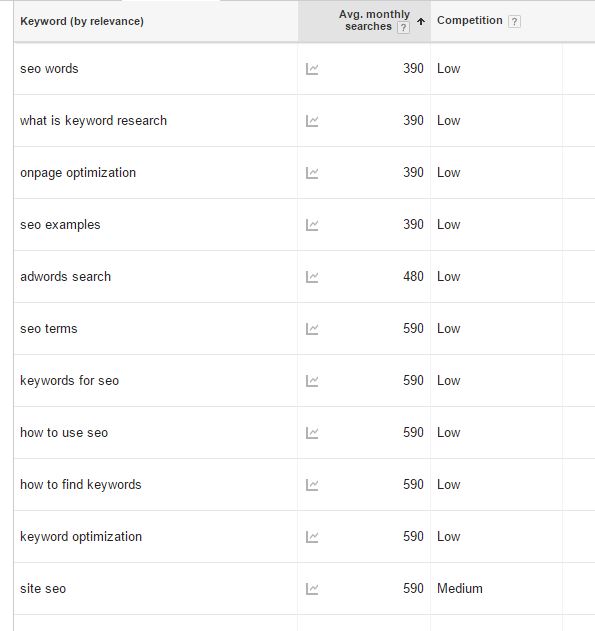Content creation is the most important thing a small business can do in order to start ranking on the search engines, with or without hiring a professional SEO company. However, just creating content isn’t enough, you have to have a plan. I recently had a client come to me who had been blogging religiously, twice a week for 8 years (she put me to shame!). Yet, after all of this dedication, she was only receiving about 20 organic searches per day. The quality of her content was great, I rarely see anybody that consistent with content, but Google wasn’t giving her credit for the great work she was doing. Her site wasn’t ranking for any keywords! Don’t let this happen to you.
Below are the common questions I get asked when I let small business owners know that they need to start blogging to get people to know about them. If my customer from the example above would have known the answers to the questions below, she would have been seeing a ton more traffic after 8 years of work.
What Keywords Should I Use?
So what keywords should I use? Keyword research is a complex beast and there are hundreds of software programs that can help you figure out the perfect keyword. However, most of these programs like SEMRUSH and Market Samurai can be really expensive and very technical. Unfortunately, I’ve found that the moment I make things complicated and expensive, then it’s just not done (after all, you all have businesses to run, right?). So, let’s break this down and make it as simple as possible. Are the expensive and time consuming ways better? Most of the time, yes, but performing some keyword research this way is WAY better than doing nothing at all!
What Keywords Should I Use Tactic 1: Keyword Research Tool
The first tactic I recommend is using the Google Keyword Planner Tool. Check out this video I created on how to perform keyword researching using Google’s keyword planner tool in a minute or less. If you are not using a professional SEO company and instead just blogging and hoping for the best, I would recommend finding a keyword that matches the following:
Avg. monthly searches < 500
Competition = Low
I know what you’re thinking, 500 searches per month? Meh. But consider if you had 5 blog posts that were getting 500 searches per month AND you did all of that without getting a professional SEO company involved. It adds up.

What Keywords Should I Use Tactic 2: “Searches related to…”
If the Google keyword planner still seems a bit too overwhelming for you, we can make it even simpler. Let’s use the following strategy:
- Go to Google.com
- Type in a phrase you think you want to blog about in the example below I’ve used “exercise for weight loss.”
- Scroll down the google results until you get to the searches related to section.
- Select one of these “long-tail keywords” and focus your blog post accordingly.
The example below shows a lot of really excellent keywords you can use.

What Keywords Should I Use Tactic 3: Google Auto Complete
Ok, let’s say your mouse’s scroll wheel doesn’t work and you just can’t bring yourself to go down to the bottom of the page. Fair enough, I don’t judge. Use Google’s Auto Complete feature by following the following steps:
- Go to Google.com
- Start typing in a phrase you’d like to use.
- Google will start auto-completing the phrases for you.
- Pick one of these phrases with 3 or 4 words in it.
Simple enough right? Back to my client who was unable to rank for anything. The keywords she was focusing on didn’t even show up in auto-complete. She was literally blogging and focusing on keywords that no one was ever searching for. Had she completed the “What keywords should I use Tactic 3” she would have been able to at least focus on a keyword that people were actually looking for.

One Final Thought on Keyword Research:
I would recommend one more itty bitty step after you’ve found a keyword you want to focus on, and that is running a search for yourself. You will really only get traffic if you are in the top 3 search results and if those are taken over by names of websites you recognize like “Wikipedia” or “CNN” then chances are really slim that you will be able to overtake them and rank in the top 3.
How Long Should My Blog Post Be?
My scripted answer to customers when I’m asked this question is “Mix it up.” Google likes a mix of long form blog posts, short blog posts, PDF’s, videos etc. Like sitting down to a Thanksgiving feast, Google likes variety. However, if you’re bound and determined to start ranking for a specific keyword, I’d recommend your blog post be 2000 words long or longer. EEK! That is a lot of words in a blog post but it has been found by this Quicksprout study and this research from serpIQ that in general the top results from Google all have a minimum of at least 2000 words!
How Often Should I Post a Blog?
Of course… My answer to this is the more the better. Google loves content but we all have businesses to run so my answer on this one is come up with a content plan and be consistent. I had a client come to me with a thousand ideas of blog posts he could create and said “I’m going to blog every day! I love to write and blog it’s going to be amazing!” I advised that it may be best for him to go ahead and blog every day, but only release a blog post twice a week, giving him some time to build up a cache of blog posts for the times he was sick or busy or unmotivated. This is also what I recommend to you. From Google’s perspective and your audience’s perspective… both would rather you be consistent than anything else. If that’s once a week … GREAT, post once a week, twice a month or once a quarter.
That’s basically all there is to it! Write about what people are looking for, and write enough and consistently enough to make it worth everybody’s time. Content creation can be a daunting task. Deciding what to say and finding the time to say it is hard enough, to say nothing about putting yourself out there! But it’s such a great way to let your potential clients know about you and your business and give your personality a chance to set you apart from the competition. Follow these steps so that all of that hard work has the best chance to find the audience you deserve!

